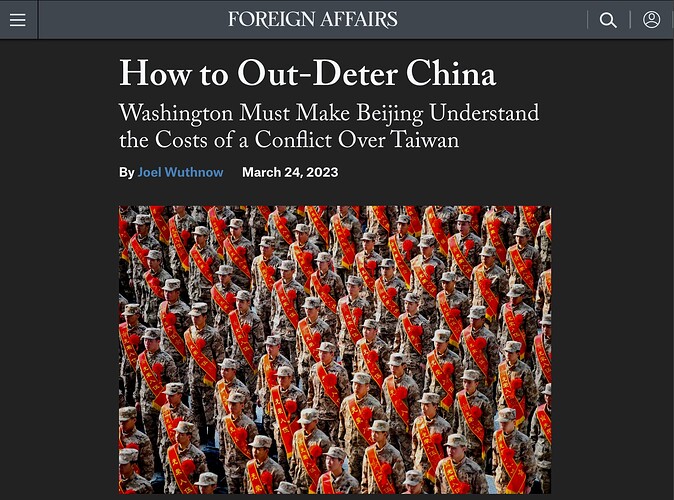-
华盛顿必须让北京明白在台湾问题上发生冲突的代价
-
1996年1月,一位中国将军警告美国,如果他们介入保卫台湾,可能会有核反应。当时,与美国战争的成本和风险使中国没有认真考虑挑起战争。从那时起,中国一直在努力通过自己的 "战略威慑 "方法使美国干预的可能性降低,这种方法依靠的是核信号。
-
美国也一直在制定自己的计划,对中国的侵略进行 “综合威慑”,包括与盟友一起威胁进行军事和经济惩罚。然而,中国因其不断增长的核武库而胆大妄为,并受到普京成功利用核威胁来限制美国对乌克兰的支持的鼓舞。这可能会导致升级的螺旋式上升和两个有核国家之间的战争。
-
美国必须向北京发出一个明确的信息,即两国之间的任何冲突都可能迅速成为灾难,以削弱中国对自身能力的信心。如果美国在这方面取得成功,它可以帮助防止与台湾的武装统一,避免两个有核国家之间的战争。
-
直到最近,中国人民解放军认为,由于美国无可匹敌的军事力量和中国的核力量劣势,他们无法阻止美国介入台湾冲突。此后,中国努力增强其军事能力,建造被称为 "刺客之锤 "的武器,为其军队登陆台湾争取足够的时间。
-
这些武器包括反舰弹道导弹、远程导弹和轰炸机,据推测这将为解放军部队在美国军队到达之前登陆台湾并夺取该岛争取足够的时间。中国迅猛的军事现代化努力使他们成为该地区的一个强大的力量,尽管与美国的战争仍然是一个危险的提议。
-
美国军方一直在适应中国的潜在威胁,使他们能够对解放军的入侵部队进行毁灭性的打击。这包括更先进和强大的远程轰炸机、核攻击潜艇和灵活的多领域特遣部队。即使解放军以某种方式设法在美国的靴子落地的情况下夺取台湾,仅对美国进行常规战争的军事成本就将是惊人的。
-
中国有理由相信,由于在全球经济衰退和美国国会大厦遇袭后,人们认为美国已经衰落,它可以阻止美国的干预。
-
中国正在扩大其战略武器库,并对其军事力量更加自信,洲际弹道导弹发射器从100枚增加到450枚,核弹头预计将从400枚增加到1500枚,以及可以到达美国大陆的新型远程导弹和具有双重能力的轰炸机。
-
中国也注意到了普京的核剑拔弩张和对美国和欧洲干预乌克兰的成功威慑。
-
中国认为,它自己的威慑方法可以在没有美国认真回应的情况下取得对台湾的胜利。
-
这种说法很可能与现实脱节,因为拜登已经赞同如果中国攻击台湾,美国将迅速进行干预。
-
美国战略与国际研究中心进行的战争游戏表明,如果美国不介入,台北会在几周内投降。
-
中国可能被对台湾相对容易的胜利前景所诱惑,但这可能会导致一场更大的、可能是核战争。
-
中国可能会高估自己的威慑方法的成功,而误入一场它没有准备的冲突。
-
美国的威慑方式与中国的威慑方式不同,这使华盛顿具有一些优势。美国的战略强调与盟友的协调,而中国缺乏盟友。它还汇集了国家权力的所有工具,而中国的政策则围绕着军事。
-
华盛顿还必须设法防止中国相信美国可以在冲突开始时轻易地被吓倒。这可以通过战略沟通来实现,以削弱中国领导人对其自身威慑力的信心,并强调核姿态的风险。
-
美国官员应该明确指出,使用某些工具不会让美国决策者感到胆怯,而只会导致事态进一步升级,还应该向中国保证,如果北京不对美国领土使用类似的武器,美国就不会把中国大陆作为攻击目标。
-
Washington Must Make Beijing Understand the Costs of a Conflict Over Taiwan
-
In January 1996, a Chinese general warned the US of a potential nuclear response if they intervened in defense of Taiwan. At the time, the costs and risks of war with the US prevented China from seriously considering provoking one. Since then, China has been working to make US intervention less likely through its own “strategic deterrence” approach, which relies on nuclear signals.
-
The US has also been working on its own plans for the “integrated deterrence” of Chinese aggression, which involves threatening military and economic penalties in concert with allies. China, however, is emboldened by its growing nuclear arsenal and inspired by Putin’s success in using nuclear threats to limit US support for Ukraine. This could lead to an escalatory spiral and a war between two nuclear-armed powers.
-
The US must send an unequivocal message to Beijing that any conflict between the two countries could quickly become catastrophic, to undermine China’s confidence in its own capabilities. If the US is successful in this, it could help to prevent an armed reunification with Taiwan and avoid a war between two nuclear-armed powers.
-
Until recently, the People’s Liberation Army (PLA) believed that they could not prevent the United States from intervening in a conflict over Taiwan due to the U.S’s unrivaled military power and China’s nuclear inferiority. China has since worked to augment its military capabilities, building weapons known as Assassin’s Maces to buy enough time for their troops to land on the island.
-
These weapons include antiship ballistic missiles, long-range missiles, and bombers which would presumably buy enough time for PLA forces to land on Taiwan and seize the island before the U.S. military could arrive. China’s breakneck military modernization efforts have made them a formidable power in the region, although a war with the U.S. remains a risky proposition.
-
The U.S. military has been adapting to potential Chinese threats in ways that could allow them to conduct devastating strikes against a putative PLA invasion force. This includes more advanced and powerful long-range bombers, nuclear attack submarines, and nimble multidomain task forces. Even if the PLA somehow managed to seize Taiwan with U.S. boots on the ground, the military costs alone of a conventional war against the United States would be staggering.
-
China has reasons to believe it can deter U.S. intervention due to perceived American decline following the global recession and attack on the U.S. Capitol.
-
China is expanding its strategic arsenal and becoming more confident in its military might, with ICBM launchers increasing from 100 to 450, nuclear warheads expected to grow from 400 to 1,500, and new long-range missiles and dual-capable bombers that could reach the continental U.S.
-
China has also taken note of Putin’s nuclear saber rattling and successful deterrence of U.S. and European intervention in Ukraine.
-
China believes that its own methods of deterrence could lead to victory against Taiwan without serious U.S. response.
-
This narrative is likely out of touch with reality, as Biden has endorsed a rapid U.S. intervention if China attacks Taiwan.
-
War games conducted by the Center for Strategic and International Studies suggest Taipei would capitulate in a few weeks if the U.S. does not get involved.
-
China may be lured by the prospect of a relatively easy win against Taiwan, but this could lead to a much larger and potentially nuclear war.
-
China may overestimate the success of its own methods of deterrence and blunder into a conflict it is not prepared for.
-
The U.S. approach to deterrence differs from its Chinese counterpart in ways that lend Washington several advantages. The U.S. strategy emphasizes coordinating with allies, while China lacks allies. It also brings together all the tools of national power, while China’s policy revolves around the military.
-
Washington must also seek to prevent China from convincing itself that the United States can be easily deterred at the start of a conflict. This can be done through strategic communication to weaken the confidence of China’s leaders in the effectiveness of their own deterrent and to highlight the risks of nuclear posturing.
-
U.S. officials should make plain that the use of certain tools would not cow U.S. decisionmakers but would only lead to further escalation, and should also reassure China that the United States will not target the Chinese mainland with similar weapons if Beijing refrains from using them against U.S. territory.
